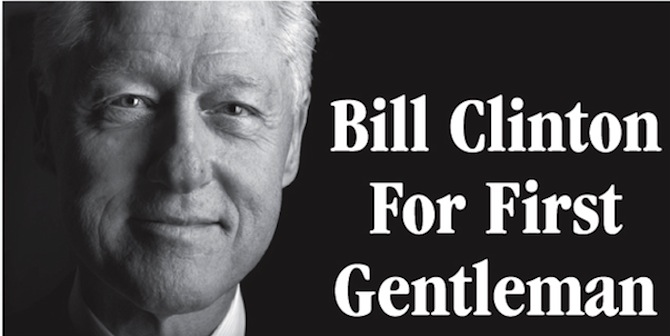
Lou Henry and her pandering husband — I mean, of course, Herbert and his devoted wife. How silly of me — set a precedent which lasted up until very recently. The President would be a burly, tough nephew of his Uncle Sam, while the First Lady would be a softer, more typically feminine check. Some First Ladies, such as Eleanor Roosevelt and Jackie Kennedy, have been amazing activists and lobbyists in their own right but have generally been regarded as an auxiliary to their husband’s achievements. Not so this time round. Hillary Clinton is the driving force behind the Clinton’s Washington dynasty. Bill was shaking hands and taking selfies with students while Hillary was backing war legislation in the Senate. In 2009, Bill was in Haiti as a UN envoy while Hillary was overseeing continuation of the Republican-sparked wars as Secretary of State. In the last few months, Bill has been unleashed to drive the Clinton presidential campaign on the ground, while Hillary has remained mostly behind closed doors. Like a gladiator of yore, she waits in the Hypogeum to rise up, do battle against Bernie Sanders and then retire once more.
Apart from the clear reversal of gender roles going on here, it brings up some interesting questions of what will happen to Bill, should Hillary become the president in November. ‘The First Gentleman.’ Even the words sound unusual, considering the uninterrupted succession of First Ladies. Yet why is this the case? Why does even the idea of a First Gentleman seem so strange? The term “First Lady” implies exactly what it is; the first woman in the line of command. In some senses, the head honcho of femininity. This reflects the still rather retro idea of gender norms in the United States. Throughout the two centuries that America has been around, the idea of a hardworking man being supported and helped along by a doting wife has prevailed. The wife has been the head of the family, while the husband has been head of the household. Tactician and strategist. One, guess who, always subordinate to the other.
Thankfully, this inherently sexist image has begun to finally dissipate (well, maybe not in the South), but we should question why the terminology hasn’t changed with it. Why is it necessary to specify which gender the sitting President’s spouse is? We might question why the spouse is even given this rather demeaning title in the first place. This is not the case in other countries, even other presidential systems. Monarchies depended on marital ties but most European states have generally allowed the leader’s wife or husband to continue with their lives largely uninterrupted. For instance, Samantha Cameron has been capable of acting as a business consultant outside Downing Street while her husband does parliamentary stuff on the Floor. This isn’t the case in the system founded allegedly on equality. The United States presidency has always officially forced the First Lady into a largely honorary role subordinate to her husband, even if they have been doing work equally influential elsewhere.
In this campaign’s case, it is worth questioning whether therole would even benefit either of the Clintons. Bill has done sterling work for the UN and for charity, generally creating an air of altruism. He has that gentle charisma that Hillary seems to lack. People like Bill because… people like Bill. While he’s probably the best addition to her campaign team they could pray for, that might not translate into the White House if he were to become First Gentleman. For one thing, whatever he might get up to would be overlooked in favour of Hillary. Hillary has question marks all over, from her enthusiastic backing of illegal wars to her hardline stance on the continuity of private healthcare. Her outlooks are often considered more in line with the Republicans than the Democrats, and Bill’s “Third Way” idealism would be an effective check on that perception. Yet by placing him in a position of being a permanent supporter, it may hinder any public move he could bring forward and would raise eyebrows if he were to lobby for anything vaguely contradictory to her. This could potentially spell trouble for both his reputation and Hillary’s if she were to suffer loss of popularity. Much of Bill’s CV is apolitical, for instance, the Bush-Clinton Haiti Foundation. This would presumably be dashed needlessly once he returned to the jungle of party politics as First Gentleman. All of this could be averted if he wasn’t an automatic auxiliary to the president.
From the activism of Lou Henry Hoover, to the diplomatic skill of Eleanor Roosevelt, to the perceived trustworthiness of Jackie Kennedy (oh, the irony), the line of First Ladies has been a succession of fantastic, smart, dedicated women who have often rivaled their husband’s achievements. Yet by the nature of a title which sounds trivial and suggests mere support in line with classic gender roles, the First Lady often has not received the credit they deserve. Hillary Clinton, from her war enthusiasm to her hawkish economic policies, is not the clichéd feminine image. Nor is her husband the stereotype of masculinity most presidents have aspired to (in their own minds, if no-one else’s). Why do we insist on demeaning a president’s spouse in this way when they can function perfectly in their own right? Indeed, Bill Clinton may operate best rather individually, as a public opinion check on Hillary. This will be an interesting development, the ‘study in scarlet’ of our day— should Hillary be elected, come November.






